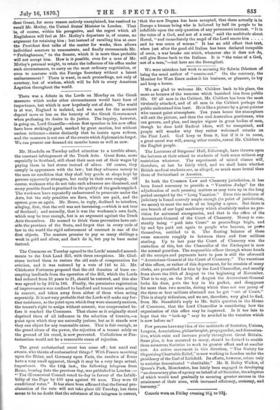The great ecclesiastical event has come off ; but amid
real -events, who thinks of ecclesiastical things ? With France marching 'upon the Rhine, and Germany upon Paris, the resolves of Rome have a very small apparent, though it may be a very large actual, importance. On the 14tj► inst., the following telegram from Rome, bearing date the previous day, was published in London :— " The (Ecumenical Council voted to-day in favour of the Infalli- bility of the Pope by 450 ayes against 83 noes. They were 62 conditional votes." It has since been affirmed that the formal pro- clamation of the vote will not take place till Tuesday, but there seems to be no doubt that the substance of the telegram is correct,
that the new Dogma has been accepted, that there actually is in Europe a human being who is believed by half its people to be infallible upon the only question of any permanent interest. "It is the voice of a God, and not of a man," said the multitude about Herod, " and immediately the angel of the Lord smote him . . and he was eaten of worms." It has an odd effect that text, when just after the good old Italian has been declared incapable of error, a war breaks out which, whatever else it does not do, will give Rome back to the Italians. It is " the voice of a God, not of a man,"—but here are the Bersaglieri.






























 Previous page
Previous page